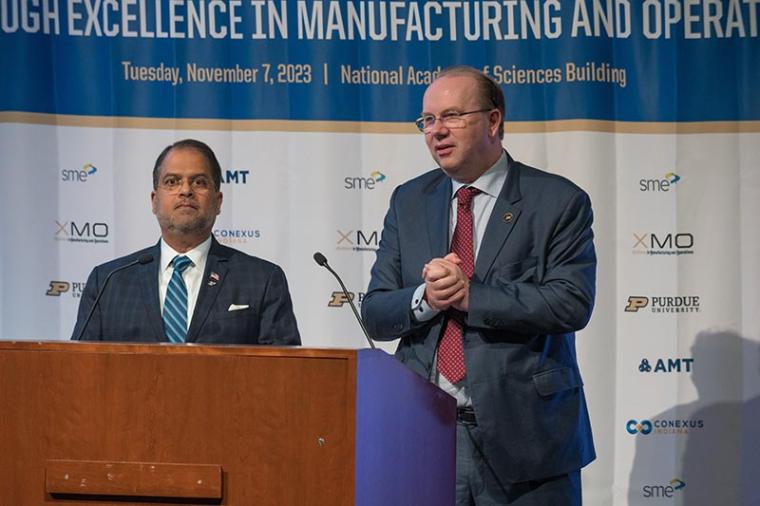
More than 250 representatives from industry, government, academia and professional societies gathered in person and online recently in Washington, D.C., for Purdue University’s inaugural national summit focusing on resilience through excellence in manufacturing and operations. Hosted by Purdue’s recently launched eXcellence in Manufacturing and Operations Purdue Engineering Initiative, or XMO PEI, the summit had the goal of gathering a dynamic coalition of partners to discuss building resilient U.S. infrastructure for and with digital, physical and sustainable manufacturing and operations.
“Reshoring, retooling and retraining for advanced manufacturing in the U.S. has become essential and urgent, and there’s no better place to accomplish the mission than the Midwest, especially here along the Hard-Tech Corridor,” Purdue President Mung Chiang said. “The XMO Summit brings expertise in the digital, physical and sustainable innovation of manufacturing across new materials, processes and applications. And it again demonstrates the national leadership of Boilermakers through Purdue@DC.”
The summit, which was held at the National Academies of Sciences, Engineering, and Medicine, focused on three key pillars of America’s resilience in advanced manufacturing: reshoring (also called onshoring), retooling, and retraining in manufacturing and operations, or M&O.
XMO PEI leaders said particular emphasis is needed to establish a resilient American supply chain for such critical industrial sectors as defense and space, agriculture and foods, transportation and logistics, semiconductor and microelectronics, and pharmaceuticals.
This initiative is aimed at overcoming the severe national challenges in the supply chain — for example, manufacturing for defense, semiconductor chips and microelectronics systems, food and agriculture, and more — that have been exposed in recent decades by events such as 9/11, COVID-19 and the Ukraine war, which shined a light on major gaps in manufacturing and operations in making the American supply chain resilient.
“Major supply chain gaps the nation experienced over and over, when coupled with manufacturing globalization, have jeopardized America’s ability to provide resilient commerce, defense and a high quality of life for all Americans,” said Ajay Malshe, the R. Eugene and Susie E. Goodson Distinguished Professor of Mechanical Engineering and XMO co-chair. “Any supply chain is only as good as its weakest link. We need all physical, digital, sustainable M&O tools and a skilled workforce to make those links strong and tough to deliver supply chain resilience when the next national and global crises challenge us.”
Summit discussions included why U.S. companies are compelled to bring major elements of their manufacturing back to the U.S.; how new major investments in physical, digital and sustainable technologies and their rapid translations by engineering and business are necessary to build resiliency; and what role the educational spectrum will take to develop a diverse and integrative workforce in support of a second U.S. manufacturing and operations renaissance.
“The renaissance is critical for our ability to innovate and, hence, our prosperity,” said Stephan Biller, the Harold T. Amrine Distinguished Professor in the School of Industrial Engineering and Mitchell E. Daniels, Jr. School of Business, and XMO co-chair. “The U.S. is starting to make important moves toward building robust supply chains, but we need to be more focused on innovation and workforce development to achieve resiliency in manufacturing and operations that is digitally enabled and sustainable. This is particularly true for small and medium manufacturers that typically lack a manufacturing and operations innovation exosystem.”
The summit resulted in a seven-point call to action:
- Form a national coalition at the intersection of M&O of industrial, government and academic organizations, along with professional societies.
- Integrate M&O by funding sponsors in every aspect of research, development and implementation.
- Enable large investments in physical, digital and sustainable M&O engineering for a resilient commerce and defense supply chain.
- Build an innovation ecosystem for small- and medium-sized manufacturers to enable them to digitalize their physical M&O assets to participate in the ongoing artificial intelligence revolution.
- Establish industrial policies and incentives for M&O to restore, retool and retrain, and grow and sustain the number of startups.
- Invest in M&O’s physical, digital and sustainable infrastructure, similar (in scale) to the federal CHIPS and Science Act of 2022, for retooling rural and urban America for small-, mid- and large-size national enterprises and their ecosystem.
- Infuse M&O educational content in every academic program to create and retain workforces for all enterprises.
More than 250 stakeholders attended the summit, either in person or virtually, representing 29 states. This is the second summit convened by Purdue in the nation’s capital this year, after April’s CHIPS for America: Execute for Success Summit in the Russell Senate Office Building.

There are no comments
Please login to post comments